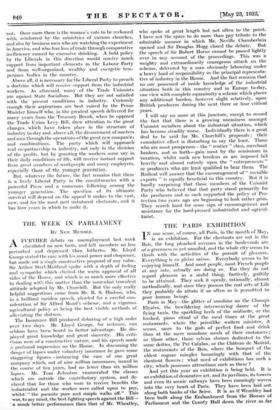THE WEEK IN PARLIAMENT
By NEW MEMBER.
AFURTHER debate on unemployment last week elucidated no new facts, and left members no less perturbed and depressed than hitherto. Mr. Lloyd George stated the case with Ills usual power and eloquence, but made not a single constructive proposal of any value. Sir Arthur Steel-Maitland. spoke with a depth of feeling and sympathy which elicited the warm approval of all sides of the House, and which is so much more effective in dealing with this matter than the somewhat truculent attitude adopted by Mr. Churchill. But the only really helPful suggestions came from Mr. R. S. Hudson, who, in a brilliant maiden speech, pleaded for a careful con- sideration of Sir Alfred Mond'S scheme, and a vigorous agricultural policy as being the best visible methods of alleviating the distress.
The Insurance Bill produced debating of a high order over two days. Mr. Lloyd George, for instance, can seldom have been heard to better advantage. He dis- played great knowledge and great sincerity. His criti- cisms were of a constructive nature, and his speech made a profound impression on the House. In discussing the danger of lapses under voluntary insurance he gave some staggering figures—instancing the case of one great company which, out of nine million insurances, issued in the course of ten years, had no feWer than six million lapses. Mr. Tom Johnston enumerated the classes which are outside the contributory system, and de- clared that for those who were to receive benefits the industrialist and the worker were Called upon to pay, -whilst " the parasite pure and simple walks off." This was, to my mind, the best fighting speech against the Bill- --a much better performance than that of Mr. "Wheatley, who spoke at great length but not often to the point.' I have not- the space to do more than pay tribute to the admirable manner in which Mr. Neville Chamberlain opened and Sir Douglas Hogg closed the debate. But the speech of Sir Robert Home cannot be passed lightly over In any account of the proceedings. This was a weighty and extraordinarily courageous attack on the scheme, delivered by a man obviously labouring under a heavy load of responsibility as the principal representa- tive Of industry in the House. And the fact remains that no one 'possessed of inside • knowledge of the industrial situation both in this country and in Europe to-day, can view with complete equanimity a scheme which places any additional burden, however slight relatively, upon British producers during the next three or four critical years.
I will say no more at this juncture, except to record the fact that there is a growing uneasiness amongst Unionist members about the industrial situation, which has become steadily worse.. Individually there is a great deal to be said for Mr. Churchill's proposals : their cumulative effect is disturbing to say the least. Thoe who are most prosperous—the " rentier " class, merchant bankers, and. so forth—gain most by the remissions in taxation, whilst such new burdens as are imposed fall heavily and almost entirely upon the " entrepreneurs " or producers who are least qualified to bear them. The Radical will answer that the encouragement of " invisible exports " is. equally beneficial to this country. But it •is hardly surprising that thoge members' of the Unionist PartY who belieVed that that party stood primarily for the producers and as such supported the policy of Pro- tection two years ago are beginning to look rather grim. They search hard for some sign of encouragement and assistance for the hard-pressed industrialist and agricul- turist.










































 Previous page
Previous page